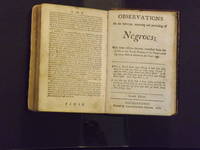
Discours d'un negre a un Européen, piece qui a concouru pour le prix de l'Académie Françoise, en 1775.
by Doigny du Ponceau (1750-1830)
- Used
- Condition
- See description
- Seller
-
The Hague, Netherlands
Payment Methods Accepted
About This Item
Obscure early lyrical poem about a Black American raging against slavery, promising "the revenge of a smoldering black revolution"
Doigny du Ponceau (1750-1830).
Discours d'un negre a un Européen, piece qui a concouru pour le prix de l'Académie Françoise, en 1775.
Paris, Demonville, 1775.
8°. 15, [1 blank] pp. Collates: A8. With woodcut head- and tailpieces.
Contemporary half calf with marbled sides, red title-shield, red edges.
[bound with 11 elogies].
First and only edition of a rare lyrical poem against slavery and racism by the little known author Doigny du Ponceau. It is set up as a fake contestant for the prize of the French Academy in 1775.
This text falls within the theme of a speech of an enslaved maroon who, confronted with execution, accuses the Europeans of their oppression and threatens them with revenge. This is found in French lyrical poems closely related to each other, ranging from 1759 to 1790, begun in 1759 by l'abbé Guillaume Antoine Lemonnier, with his Discours d'un nègre marron.
In Doigny du Ponceau's version the enslaved man is not confronted with immediate execution, but instead he accuses the European traders and settlers of enriching themselves at the cost of "human blood" and promises them "the revenge of a smoldering black revolution". From the outset, he categorically disputes the transaction made on his person and affirms his independence to his supposed owners. He also denounces the partiality of justice as a protector of the oppressor. Ultimately he calls for the destruction of such an unjust world. He promises a vengeance equal to or greater than their wickedness, which will consist in turning the weapons of their oppression against them. This inevitable revolt will be collective and massive, as there are already precedents that make the Americans tremble. In addition to accounting for all the blood shed by thousands of Africans uprooted from their lands, the maroon prophesies the imminent fall of Europe, which builds its splendour on human suffering.
As an example Du Ponceau points at "The wise inhabitants of Pensilvania, who, with the manners of the golden age, realize its happiness, are made to set their Slaves free. They think all men should be equal. What sublime morality! May this great feature of benevolence, consecrated in this feeble Work, be forever preserved in the facts of humanity!"
We traced only two copies of this book in institutions: in the BNF and the Université du Quebec. Apparently no copies of this book are held in US libraries. This poem was also, in part, published in the Mercure de France of October 1775, vo. 1, pp. 24-28.
[bound with:]
Thomas. Eloge de Henri-François d'Aguesseau. Paris, Regnard, 1763; Gaillard. Eloge de René Descartes. Regnard, 1765; Chamfort. Eloge de Molière. Regnard, 1769. [Durban]. Eloge de J.-B. Colbert. Brunet, 1773. [Dagues de Clairfontaine]. Eloge d'Abraham Duquêne. Nyon, 1766. Reyrac. Discours... dans l'église de Pompignan le jour de sa bénédiction. Villefranche de Rouergue, Vedeilhié, 1762; La Harpe. Eloge de Nicolas de Catinat. Demonville, 1775. Le Beau. Eloge de M. le comte d'Argenson. Panckoucke, 1765. [Cerutti]. Portrait de feu monseigneur le Dauphin. Paris, Lottin, 1766; Bourlet de Vauxcelles. Oraison funèbre de Louis XV. Saugrain, 1774. Thomas, Rohan. Discours prononcés dans l'Académie françoise... à la réception de M. Thomas. Regnard, 1767.
Condition: binding worn at the edges and corners, light staining throughout. Small tear in blank head margin of page 11-12 of the Discours d'un negre, not affecting text.
Literature:
Rachel Danon, Les Voix du marronnage dans la littérature française du XVIIIe siècle, Paris, Classiques Garnier, 2015.
Reviews
(Log in or Create an Account first!)
Details
- Bookseller
- ARTEM
(NL)
- Bookseller's Inventory #
- 2165
- Title
- Discours d'un negre a un Européen, piece qui a concouru pour le prix de l'Académie Françoise, en 1775.
- Author
- Doigny du Ponceau (1750-1830)
- Book Condition
- Used
- Quantity Available
- 1
- Edition
- FIRST EDITION
- Publisher
- Demonville
- Place of Publication
- Paris
- Date Published
- 1775
- Pages
- 15, [1 blank] pp
- Size
- 8°
- Weight
- 0.00 lbs
- Keywords
- Slavery, France, Poetry, Black History
- Bookseller catalogs
- Slavery; Literature; America; Black History;
Terms of Sale
ARTEM
About the Seller
Glossary
Some terminology that may be used in this description includes:
This Book’s Categories
Also Recommended
-

Save 10% on every purchase!
Join the Bibliophiles’ Club and start saving 10% on every book.
$29.95 / Year










